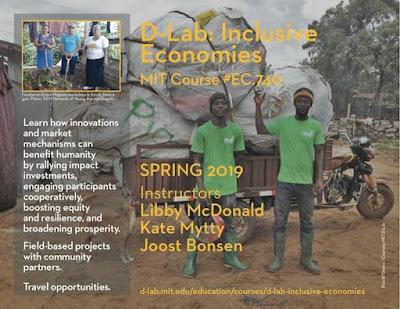Together with colleagues Kate Mytty and Libby McDonald, I'm co-teaching the Inclusive Economies seminar at MIT this Spring 2020 every Wed morning starting Feb 5th from 9:30-11:30a in N51-310, the D-Lab classroom area!
We explore how innovations and market mechanisms can benefit humanity by rallying impact investments, engaging participants cooperatively, boosting equity and resilience, and broadening prosperity. We look at market mechanisms for maximizing participation, choice, and growth; impact investing approaches which are socially responsible and include metrics that matter; cooperative and mutual ownership structures for shared gains; equitable citizen participation in basic and natural resource wealth; and the role of new technologies and methods towards boosting affordability, accessibility, and overall inclusive prosperity.
Showing posts with label Inclusive. Show all posts
Showing posts with label Inclusive. Show all posts
01 February 2020
05 February 2019
Inclusive Economies ~ Spring'19 D-Lab Seminar
Together with colleagues Kate Mytty and Libby McDonald, I'm co-teaching the Inclusive Economies seminar this Spring 2019 every Wed morning starting Feb 6th from 9:30-11:30a in N51-350, the D-Lab classroom area! We explore how innovations and market mechanisms can benefit humanity by rallying impact investments, engaging participants cooperatively, boosting equity and resilience, and broadening prosperity. We look at market mechanisms for maximizing participation, choice, and growth; impact investing approaches which are socially responsible and include metrics that matter; cooperative and mutual ownership structures for shared gains; equitable citizen participation in basic and natural resource wealth; and the role of new technologies and methods towards boosting affordability, accessibility, and overall inclusive prosperity. 

28 August 2014
College Bound ~ Graduates Beating the Odds!
 Todd Feathers of the Globe spotlights the very compelling Students who had been written off now heading to college...
Todd Feathers of the Globe spotlights the very compelling Students who had been written off now heading to college... "College Bound focuses its attention on those considered unlikely to succeed. They seek out dropouts, gang members, inmates, and others with setbacks in their past and aggressively push them toward college. [...] The paths taken by the students to reach Wednesday’s graduation ceremony are filled with heartbreak and hard choices. [Says rising graduate Sanjoana Fernandes-Centieo] “I am so proud about myself because I struggled so hard,” she said. “It’s not the end, it’s just one step to continue my education."This is epic and I salute the graduates as well as their supporters!
24 December 2012
Boomtown Slum ~ Economist on Kibera Daily LIfe
The Economist xmas double-issue spotlights upwardly mobile Africa in Boomtown slum ~ A day in the economic life of Africa’s biggest shanty-town...
"Africa’s biggest slum, it is home to perhaps a million people. Nobody knows for sure, since Kibera is left to its own devices. Government is absent: it offers the residents (regarded as squatters) no services, opens no schools, operates no hospitals, paves no roads, connects no power lines and pumps no water into homes. And yet Kibera, wedged in between ornate embassies and a well-tended golf course, is an integral part of Nairobi [...] Kibera’s origins are Western. A century ago British colonial rulers gave small plots of land on the edge of Nairobi to Nubian soldiers serving in the King’s African Rifles. They built mud huts [...] The land was later nationalised but the Nubians stayed put and rented parts of it to newcomers. Today most homes are made of ragged tin and reused timber. [...] Kibera is a thriving economic machine. Local residents provide most of the goods and services. Tailors are hunched over pedal-powered sewing machines. Accountants and lawyers share trestle tables in open-air offices. Carpenters carve frames for double beds along a railway line. Whole skinned cows hang in spotless butcher shops. [...] Life in Kibera can be harsh. Disease is rife, food is short for some, and death can come suddenly. [...] The key to making it in Kibera is access to capital. A market of one million potential customers crowds in on entrepreneurs, but raising the money to start a business is hard. Most banks won’t lend to them because they have no collateral, perhaps not even a fixed address. Those who manage to borrow face high interest rates. [...] Kibera may be the most entrepreneurial place on the planet. Residents have no choice but to look after themselves."Inspiring resilience. And yet further evidence that we need more inclusive innovations and beneficial slum solutions.
06 August 2012
Rethinking Slums ~ Towards Inclusive Upgrading
Thanks to Africa Unchained's Emeka Okafor for Reframing 'Slums' and pointing to Bombastic Elements and spotting this piece by Stretch Ledford on Ajelogo: After the Bulldozers in Lagos...
"Since 1997, Funmilayo Omotosho lived and worked in a market in Ajelogo, a neighborhood in Lagos, Nigeria. For reasons it has not made public, the Lagos State Government ordered that the Ajelogo market be destroyed during the early morning hours of March 7, 2010. More than 10,000 residents and vendors were displaced. With her business, home, and community in ruins, and with nowhere else to go, Fumilayo still lives in Ajelogo, amidst the ruins of her home and business."Destroying markets seems like the very last thing one should do in order to improve peoples lives. What the hell is going on here? And here's a similar situation in Mumbai's Dharavi... And in Nairobi's Kibera...
Subscribe to:
Posts (Atom)











